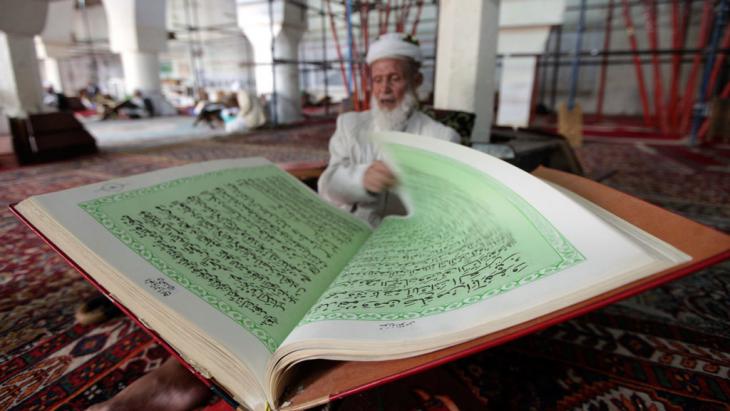Conservative Muslims refute the violence of IS

Politicians and journalists are still calling on Muslims to distance themselves from the terror being perpetrated by Islamic State. However, largely unnoticed by them, practically all relevant Muslim associations, and above all Islamic authorities – including those who are decidedly traditional and conservative – have condemned this organisation as barbaric and un-Islamic.
If critics of Islam ignore this and claim that there is a proximity between basic principles of Islam and IS terrorism, then their image of Islam is in some way similar to that of the fundamentalists. This image has very little to do with the Islam of the majority of Muslims and their authorities.
In this regard, a letter to the leader of the terrorist organisation published a few weeks ago is particularly revealing: http://lettertobaghdadi.com/. It was authored by more than 120 notable scholars, who for the most part come from a conservative spectrum of Islam. Therefore, the detailed examination of IS ideology and its references to the Koran in this letter was not undertaken by modern reformers or Islamic enlightenment thinkers, but by Islamic authorities operating within a decidedly orthodox thought structure.
The Grand Mufti of Egypt, Sheikh Shawqi Allam, is among the authors, as is Sheikh Ahmad al-Kubaisi, the founder of the Union of Religious Scholars (Ulema) in Iraq. They also include scholars from Chad and Nigeria to Sudan and Pakistan. They obviously feel the need to position Islamic theology in clear opposition to the terrorists. What other explanation could there be for scholars writing to terrorists?
The letter is 25 pages long and is addressed to: "Dr Ibrahim Awwad al-Badri, alias 'Abu Bakr al-Baghdadi'" and to the fighters and followers of the self-declared Islamic State. But the people it is really speaking to are undoubtedly the Muslims whom the authors fear could be ensnared by IS propaganda.

False caliph
Al-Baghdadi, who was born in Iraq in 1971 and calls himself "Abu Bakr" after Islam's first caliph and "al-Baghdadi" as a way of asserting his claim to Baghdad, the capital of the Abbasid caliphs, is not addressed as a caliph by the writers of this letter. The reason for this, according to the authors, is that in Islamic law, the declaration of a caliphate – in other words, the appointment of the political successor to the Prophet – can only happen with the consent of all Muslims.
The text summarises 24 offences committed by the so-called "Islamic State": "It is forbidden in Islam to kill emissaries, ambassadors, and diplomats; hence it is forbidden to kill journalists and aid workers." Or: "It is forbidden in Islam to harm or mistreat—in any way—Christians or any 'People of the Scripture'."
A detailed justification is provided for each statement. For example, the letter says that it is the duty of all Muslims to view the Yazidis as "People of the Scripture". Accordingly, it is illegitimate to declare them unbelievers or even treat them as outlaws. Why? "From the legal perspective of Shari'ah they are Magians, because the Prophet said: 'Treat them as you treat People of the Scripture'."
The origin of these quotes is meticulously outlined in footnotes. In this case, it is the Hadith of Imam Malik and Imam al-Shafi'I, two of the four founders of the four Sunni legal schools.
In addition to this, the authors explain the prerequisites for Islamic jurisdiction. In doing so, they are indirectly denying the self-declared caliph any kind of authority and competence to make legally binding statements.

The Koran needs to be interpreted correctly
According to the authors, the methods of interpretation set out by God in the Koran and by the Prophet in the Hadiths say: everything that has been revealed on a particular issue must be considered in its entirety. The focus cannot be on individual fragments. This method comes from the Scripture itself, among other things from the following verse of the Koran: "What, do you believe in part of the Book and disbelieve in part?" (Al-Baqarah 2:85).
When all the relevant passages are brought together, the "general" has to be separated from the "specific" and the "conditional" from the "unconditional". The unequivocal verse must likewise be separated from the ambiguous.
Then the "reasons and circumstances for revelation", the "asbab al-nuzul", for all these verses as well as all the other conditions for interpretation as established by the "classical" scholars must be factored in. And only then – with recourse to all the available written sources – can laws be made or interpretations given.
It is, in short, not permitted to quote a verse without considering the whole Koran and the Hadith. The authors of the letter describe it as an obligation to bring all texts into harmony with each other as far as possible, and with this in mind, they invoke Imam al-Shafi'i and a universal consensus among all scholars of legal theory.
In this context, the authors of the letter also examine the verses of the Koran that appear to legitimate violence: "Permission [to fight] is granted to those who fight because they have been wronged" (Al Hajj, 22:39).

Frequently cited surah
This and similar verses of the second surah are the ones that are most often quoted – by critics of Islam in a negative way, and by jihadists in a positive way – to prove the propensity for violence that is supposedly inherent in Islam. The scholars, however, draw exclusively on a particular event, the "reasons and circumstances for revelation".
In this regard, the verse only corresponds to the following specific political situation: in the year 630, the Prophet marched into Mecca to fight the heathen people there, thereby breaking a peace treaty that he had agreed himself two years previously. His action therefore required some legitimation, which the verse provides. What was meant here was that the people of Mecca could be fought, because they had previously "sinned" against the Prophet's community. They had driven out his followers and wanted to kill him.
Consequently, the verse does not yield a general instruction for all Muslims. The authors of the letter expressly state: "Thus, jihad is tied to safety, freedom of religion, having been wronged, and eviction from one's land. These two verses were revealed after the Prophet and his companions suffered torture, murder, and persecution for thirteen years at the hands of the idolaters. Hence, there is no such thing as offensive, aggressive jihad just because people have different religions or opinions."
This interpretation is by no means modern or inspired by the West. The method being used here has existed in Islamic theology for centuries. A whole branch of it is concerned with the aforementioned reasons and circumstances for revelation. In other words, there has always been the assumption of a kind of dialectical relationship between text and addressee, and the context in which a verse was revealed was always examined in order to better understand its meaning and its scope.
An individual case such as the one described in this surah cannot serve as a precedent for other apparently similar situations. Islamic law may be essentially shaped by thinking that relies on precedent, but as the authors of the letter say, "It is not permissible to invoke a specific verse from the Koran as applying to an event that has occurred 1,400 years after the verse was revealed."

Probematic aspects
As the letter shows, Islamic theology has sufficient argumentative resources to counter the arguments of the so-called "Islamic State". All the same, the approach taken by the authors of the letter still has its problematic aspects from a liberal point of view.
For example, the authors stand by the validity of corporal punishment, even though they tie its use to strict criteria. Likewise, the authors of the letter state their opposition to sexual violence when they criticise the reintroduction of slavery, and to denying women their rights, but one searches in vain for an endorsement of equal rights.
Where women are concerned, the authors of the letter still obviously cling to traditional structures. Further thought is necessary here. Clear positions must be adopted, and a statement should be made that in the twenty-first century, corporal punishment and sexual discrimination are incompatible not only with Western values, but with the ethos of Islam.
Other thinkers have nailed their colours to the mast. Iranian women's rights campaigners, for example, are calling for equal rights, and using the spirit of the Koran in their arguments. Historically, they say, the Koran initially improved the situation of women, but it did not lead to entirely equal rights, which would not have been communicable to the society of that time. All the same, justice can be clearly seen as the goal of the prophecy. And in this spirit, equal rights must be achieved today.
Others, like the Pakistani Fazlur Rahman, have developed an interpretive method for transferring the message of the Koran to the present day. Rahman calls it "double movement": you must first study the context in which the Koran was proclaimed; then you will understand the original message. In a second movement, you can extrapolate from this the principles and values that could count as norms today in the spirit of the Koran.
Fazlur Rahman, and with him the Ankara school whose modern Koran hermeneutics have been very influenced by him, go much further in terms of content than the traditionally-minded writers of the letter. For example, Rahman reaches a pluralistic theology of religions through his "double movement" approach.
Even so, the authors of the letter stipulate a link between revelation and history, and insist on the necessity of subjecting even seemingly unambiguous verses from the Koran to a detailed linguistic and historical interpretation in the framework of the overall context, instead of simply taking them literally. In contrast to this, the process of cherry-picking individual verses from the Koran in order to prove a thesis formulated in advance, as practised by fundamentalists and some critics of Islam, is simply grotesque from the viewpoint of Islamic theology, and a sign of ignorance.
Katajun Amirpur
© Qantara.de 2014
Translated from the German by Ruth Martin
Dr Katajun Amirpur is a Professor of Islamic Studies at Hamburg University. Her book "Den Islam neu denken. Der Dschihad für Demokratie, Freiheit und Frauenrechte" (Rethinking Islam: the jihad for democracy, freedom and women's rights) was published by C. H. Beck in 2013.
